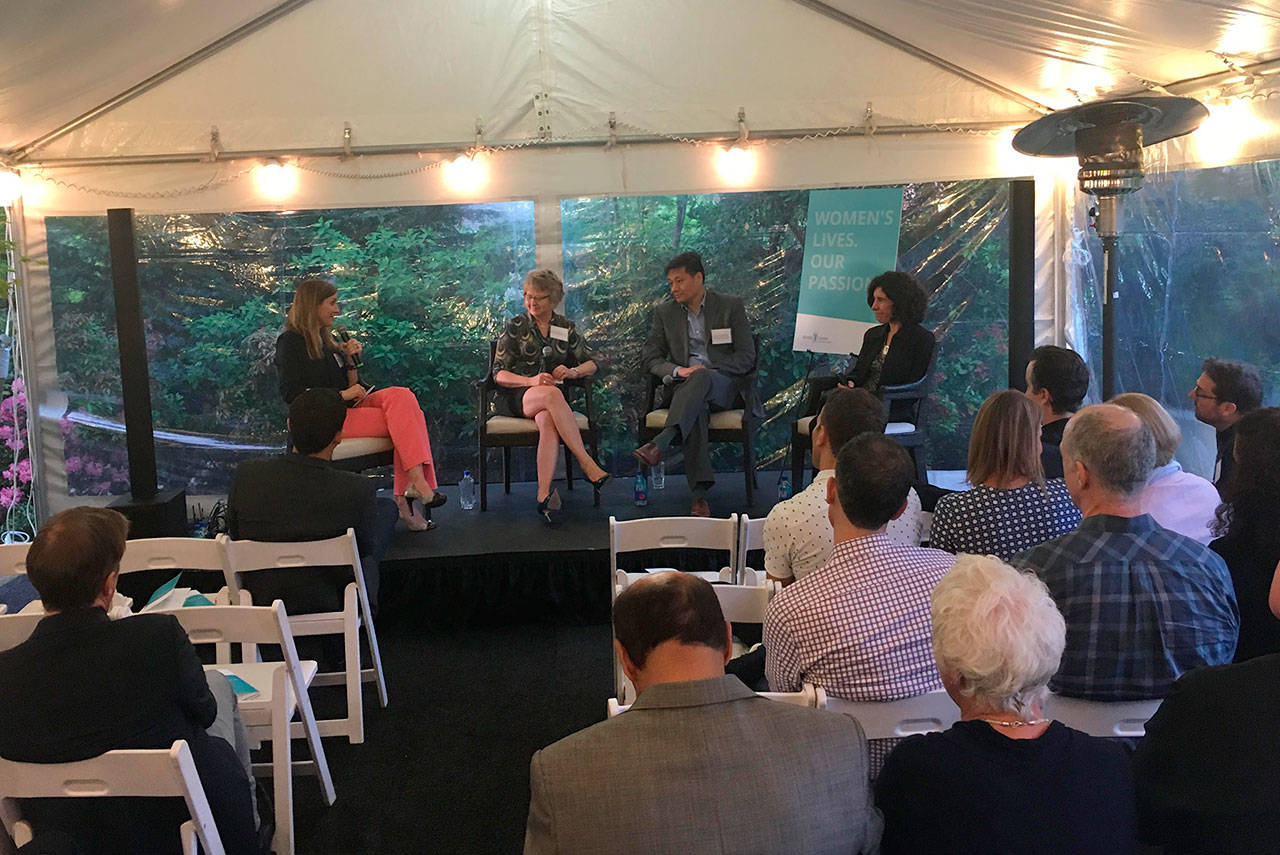A small group of passionate community members gathered at an event on Mercer Island on May 9 to support the Rivkin Center for Ovarian Cancer, and hear from research scientists and a survivor about their fight against the rare disease.
Ovarian cancer is the most deadly gynecological cancer, killing more than 22,000 women in the United States each year, but it continues to be underfunded by federal funding agencies as compared to other cancers, according to the Rivkin Center. The nonprofit was founded in 1996 by Islander Dr. Saul Rivkin, and has awarded millions of dollars in grants for ovarian cancer research.
A board member and two beneficiaries of Rivkin Center funding — Dr. Garnet Anderson, Dr. Rosana Risques and Dr. John Liao — sat on a panel on Wednesday and talked about some of the barriers and opportunities in their work.
Anderson, a Fred Hutch public health researcher, said that the greatest challenge, besides funding, is the relative rarity of ovarian cancer. Researchers also face problems with early detection and false positives. Anderson’s work focuses on clinical trials, chronic disease prevention and women’s health.
Liao, a gynecologic oncologist and professor at the University of Washington, said he’s interested in ovarian cancer, and how immunology and vaccines can help, because he was a physician before he became a researcher. He got into the field because of his relationships with patients, and said that for him, “it’s personal.”
“I was aware of the limitations, the side effects and the implications of the therapies we had… And I was dissatisfied,” he said.
He is now studying ways the immune system can help fight cancer.
“Our body has evolved to recognize things that don’t belong there, and get rid of them,” he said. “Cancer has developed ways to escape this… We need to reeducate our immune system to fight cancers.”
Risques, an assistant professor in UW’s department of pathology, is interested in using new technology and DNA sequencing to help with early detection for high risk women, such as those with BRCA gene mutations. She is hoping to help develop a screening test for cancers using blood or a uterine lavage, but is “not there yet.”
“It’s like finding a needle in a haystack,” she said. “But we can do this because of super powerful sequencing technology. It’s looking very promising.”
All three agreed that though it’s an exciting time for ovarian cancer research, funding remains the biggest hurdle. The latest federal budget increased funding for the National Institute of Health (NIH), but the funding rate of the National Cancer Institute (NCI) is 7 percent, Anderson said. Seed money is “critical,” she said, because scientists often need to present good preliminary data to be competitive in the grant process.
That’s where the Rivkin Center comes in. For every $1 invested by the center, scientists bring in an additional $8.50 of research funding from other sources, and 60 percent of Rivkin awardees are successful at getting funding to continue their work.
“The Rivkin Center is a group of folks that have a passion for a particular cancer,” Liao said. “For me, these are the patients that I see and the diseases I care about, but to have an organization advancing the cause is really important.”
The Rivkin Center recently announced that it has awarded $1.185 million in ovarian cancer research grants for 2018, with 14 recipients from the U.S., Italy, Australia and Israel. Their projects focus on prevention and early detection, DNA repair, chemotherapy resistance and novel therapies including immunotherapy. Sixty-four percent of the awardees are women.
“The projects selected this year have tremendous potential to move the progress of ovarian cancer research forward, and help women live longer, healthier lives,” said Joe White, executive director of the Rivkin Center.
The center also supports local prevention and early detection screening programs, free educational workshops and symposiums. It recently merged with CanCan Health, founded by Island resident Heike Malakoff, which puts on free breast and ovarian cancer education parties and empowers women to be proactive about their health by giving them tools for early detection, prevention and self-advocacy.
Panel moderator Kirsten Ward, a breast cancer survivor and UW grad, asked the scientists where they see cancer research going in the next five to 10 years.
Anderson predicted advances in immunotherapy and immunology, and Risques anticipates tools with more sensitivity to detect tumor DNA in blood. Liao said he hoped for a change in the way cancers are discussed, and for individualized solutions.
“The way we’ve been speaking about cancers is not correct. There’s not one ovarian cancer, but many,” he said. “Even if it appears the same under the microscope, it isn’t.”
Anderson also said that there are ways people can help with cancer research now, besides donating money.
“Contribute by participating in science,” Anderson said, as researchers often look for “normal” people to participate in trials. “We want to know how many cancer cells are circulating in your blood, and you’re still healthy? Then we know what’s abnormal.”
Ovarian cancer survivor Susun Livingston closed the event by thanking the panelists for their work, and encouraging the community to join in the fight against cancer.
The Rivkin Center has a fundraiser coming up this summer — the Swedish SummeRun on July 15 — along with other events. See www.rivkin.org for more.


